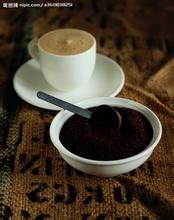Fruit aroma sour and sweet El Pacamara boutique coffee bean varieties planted market price simple

A supplementary note about this hot spring: the water temperature of the source is 85 degrees Celsius. A 2-inch pipe is used to direct the water to six hot spring pools at different elevations. The temperature at the sixth hot spring pool is 32mur34 degrees, and then the cooled hot spring water is used to process raw coffee beans. This hot spring water keeps flowing all the year round. Local people drink this hot spring water. It has a pH of 8.02 and contains ingredients that make coffee sweet.
Pacamara is the artificial breeding variety of Pacas and Maragogipe. It was first cultivated by researchers in El Salvador in 1958. Pacamara is an excellent variety under rare artificial breeding, which is better than blue, and perfectly inherits the advantages of the mother plant. Both the excellent taste of Pacas and the large size of Maragogipe are inherited by raw bean granules. The bean body is at least 70% and 80% of that of elephant beans, with more than 17 orders and more than 100% and more than 18 eyes. Average bean length 1.03 cm (general bean about 0.8-0.85 cm) average bean width 0.71 cm (general bean about 0.6-0.65), thickness 0.37 cm, bean shape plump and round. The biggest feature of this variety is that it is sour, lively and tricky, sometimes biscuit, sometimes fruity, thick and greasy. Don't underestimate El Salvador's coffee production with the best quality from El Salvador and Guatemala. In its heyday, it was once the fourth largest coffee producer in the world, but decades of civil war almost dragged down the coffee industry. fortunately, the war has stopped in recent years, and the coffee industry has come back to life. The only benefit that the civil war brought to the Salvadoran country was that the farmers' fields were barren and failed to catch up with the most popular Katimo exposure train in the past two decades, thus preserving the ancient varieties of bourbon and Tibica, that is to say, El Salvador still uses the most traditional shade planting, which is of positive significance to the aroma of coffee. In 2005, the Salvadoran mixed-race Pacamara boasted in coe, which confused many international cup testers and did not know how to grade it. It was never expected that this hybrid bean not only broke the mellow boundaries of coffee, but also expanded the visibility of Salvadoran coffee.
El Salvador boutique coffee is concentrated in the volcanic rock producing areas of Santa Ana in the west and Charantanan fruit in the northwest. The top 10 cup tests in recent years almost all come from these two producing areas, with an altitude of about 90-1500 meters above sea level, mainly bourbon (68%). Followed by Pacas (29%), mixed-race Pakamara, Dulaai and Kaddura accounted for only 3%.
The coffee harvest lasts from November to March. All the fresh coffee fruits are picked by hand.
The biggest feature of this variety is that it is sour, lively and tricky, sometimes biscuit, sometimes fruity, thick and greasy. The quality is the best from El Salvador and Guatemala.
Finca Ataisi Manor is located in the volcanic producing area of Izalco (Izakou) region, Sonsonate Province, El Salvador. Due to volcanoes, the soil of the manor is very rich in organic matter. The average elevation of the manor is about 1800 meters and the terrain is steep. It is one of the highest manors in the area. At present, the owner of the manor is run by Mr. Rene Martin. Mr. Rene Martin's idea is to maintain the original traditional planting method of El Salvador as far as possible. In addition to the necessary pruning and irrigation outside the garden to maintain a wide range of natural agroforestry ecology, more than 90% of the manor is planted Pacamara varieties were first cultivated by Salvadoran researchers in 1958. Pacamara is an excellent variety under rare artificial breeding, which is better than blue, and perfectly inherits the advantages of the mother plant. Both the excellent taste of Pacas and the large size of Maragogipe are inherited by raw bean granules. The bean body is at least 70% and 80% of that of elephant beans, with more than 17 orders and more than 100% and more than 18 eyes. Average bean length 1.03 cm (general bean about 0.8-0.85 cm) average bean width 0.71 cm (general bean about 0.6-0.65), thickness 0.37 cm, bean shape plump and round.
Pacamara (Pacamara): the pedigree is very complex. It is a hybrid of the Tibika variety elephant bean and the bourbon variety Pacas. Huge beans, second only to elephant beans, is a rising star in El Salvador and a hybrid breed of high-quality coffee all over the world in the past two years.
Won two ○○ seven Guatemala and Honduras [COE] double championships, but also arranged to host the top three awards in El Salvador. The name "Pacamara" is very good. It is a compound word of Pacas [Pacas] and elephant bean [Maragogepe]. Pacamara is an excellent variety produced by the Salvadoran Coffee Research Institute from 1957 to 1958. It was not until recent years that it became the darling of fine coffee.
Pacamara is another example of making a name for itself through COE events. In the 90s of the 20th century, some farmers in the Chalatenango producing area of South Song in Charat, El Salvador began to grow Pracamara. In 2006, a farm in this producing area took part in the competition with Pacamara and got the second place. In 2007, several farms in the same production area participated in the competition with Pacamara, and won the first, third and fourth places. The Pacamara variety was an artificial hybrid of Pacas and Maragogype, which was first cultivated by Salvadoran research institutions in the 1950s (mostly 1958). The new variety is considered to be the result of the pursuit of large grain Arabica species and inherits the good characters of the parent plant. Pacas, which has Bourbon lineage, is a native variety of El Salvador and inherits the excellent flavor of the ancient species of bourbon. It was first discovered in 1949. Maragogype is a variety of Typica that first appeared in Brazil. Because of its large bean body, it is known as "elephant bean" elephant bean.
El Salvador's unique high-grade variety Pacamara, Pacamara is a sudden variation of the bourbon species found by Pacas Pacas- in El Salvador and a hybrid with the giant bean Maragogype, a sudden variant of the Tibica species found in Brazil.
The interesting thing about Christmas farm coffee is that its refining method is secret, using mineral-rich hot spring water to process raw coffee beans. The farm is located in fertile volcanic soil and rich in natural hot spring water, so it is all used in raw bean processing; there are many coffee gardens in the world, but this method is rare.
Important Notice :
前街咖啡 FrontStreet Coffee has moved to new addredd:
FrontStreet Coffee Address: 315,Donghua East Road,GuangZhou
Tel:020 38364473
- Prev

The origin, development, history and culture of El Salvador Pacamara boutique coffee beans with fruity and rich aromas
Pacamara is the artificial breeding variety of Pacas and Maragogipe. It was first cultivated by researchers in El Salvador in 1958. Pacamara is an excellent variety under rare artificial breeding, which is better than blue, and perfectly inherits the advantages of the mother plant. It not only has the excellent taste of Pacas, but also inherits the large size of Maragogipe, and the bean body is at least like beans.
- Next

The cultivation of El Salvador Pacamara boutique coffee beans, geographical location, climate, altitude
El Salvador's unique high-grade variety Pacamara, Pacamara is a sudden variation of the bourbon species found by Pacas Pacas- in El Salvador and a hybrid with the giant bean Maragogype, a sudden variant of the Tibica species found in Brazil. The interesting thing about Christmas farm coffee is that its refining method is secret, using minerals.
Related
- Detailed explanation of Jadeite planting Land in Panamanian Jadeite Manor introduction to the grading system of Jadeite competitive bidding, Red bid, Green bid and Rose Summer
- Story of Coffee planting in Brenka region of Costa Rica Stonehenge Manor anaerobic heavy honey treatment of flavor mouth
- What's on the barrel of Blue Mountain Coffee beans?
- Can American coffee also pull flowers? How to use hot American style to pull out a good-looking pattern?
- Can you make a cold extract with coffee beans? What is the right proportion for cold-extracted coffee formula?
- Indonesian PWN Gold Mandrine Coffee Origin Features Flavor How to Chong? Mandolin coffee is American.
- A brief introduction to the flavor characteristics of Brazilian yellow bourbon coffee beans
- What is the effect of different water quality on the flavor of cold-extracted coffee? What kind of water is best for brewing coffee?
- Why do you think of Rose Summer whenever you mention Panamanian coffee?
- Introduction to the characteristics of authentic blue mountain coffee bean producing areas? What is the CIB Coffee Authority in Jamaica?

